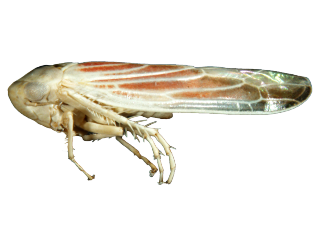



Photographer:Chris Wilson Affiliation: Sam Houston State University Source: stoppinginvasives.org Copyright: Texas Invasive Species Institute (T.I.S.I)
Leafhoppers of the genus Balclutha are generally small (3-4 mm), slender-bodied, pale or yellow-green in color. Balclutha rubrostriata can be identified by red or brown pigmentation along the forewing accompanied with straw colored forewing veins.
Overall pigmentation of nymphs may range from light to dark coloration. The nymph's body is straw-like in color with lightly pigmented brown or red stripes next to the eyes. Darker brown or red pigmentation in the form of lateral stripes can be found at the base of the antennae, legs, and abdomen.
In Thailand, the plant phytoplasma called Sugarcane White Leaf Disease (SCWL) is transmitted by several leafhoppers. Balclutha rubrostriata is one of the top carriers of this plant virus, studies have shown Balclutha rubrostriata to be the 2nd most prevalent carrier. SCWL can cause a crop yield loss of 100% in some areas of southeastern Asia, where sugarcane is a vital resource. With Balclutha rubrostriata being present in sugarcane producing counties of Texas, the threat of SCWL is coming to the United States. Balclutha rubrostriata has been confirmed in almost 20 counties in Texas. The established presence of this insect is a threat to other grass-feeding insects, sugarcane crops and sugarcane farmers alike.
The Invasive Red-streaked Leafhopper (IRSL) is a tropical species that feeds primarily on grasses. Due to the ideal habitat in the southern United States, it is very possible for the leafhopper to become established in those areas. Further, there is some concern that the IRSL will disrupt invertebrate grassland communities in light of the sheer dominance in Bexar County as noted by Zahniser et al. 2010.
Zahniser et al. 2010 noted that while sampling a site in Bexar County, Texas, they found 85% of all insects gathered were the Invasive Red-streaked Leafhopper, Balclutha rubrostriata. Upon further research, the authors noted that they found evidence of B. rubrostriata invasion in other parts of Texas, Florida, and Hawaii.
Details are still vague as to how the leafhopper entered the United States, where it entered, and exactly when the first invasion occurred. Zahniser et al. 2010 found the leafhopper in Bexar, Kerr and Travis Counties. TISI has confirmed the presence of Balclutha rubrostriata in 38 Texas counties and 1 Louisiana Parish. During field surveys it has been noticed that Balclutha rubrostriata has a close insect-host plant relationship with King Ranch Bluestem (Bothriochloa ischaemum var. songarica). The relationship seems so close that if KR Bluestem is not present then neither is the red-streaked leafhopper. What's dangerous about this is KR Bluestem is well established throughout southern, sugar-cane producing, counties in Texas. Also, the KR Bluestem is present in Louisiana’s sugarcane producing parishes.
Old World
U.S. Habitat: Grasslands particularly where King Ranch Bluestem is present.
U.S. Present: Currently the Invasive Red-streaked Leafhopper has been sighted in Hawaii, Florida, and Texas.
Texas: Zahniser et al. 2010 stated that they found a high abundance of IRSLs in Bexar County. TISI has found the leafhopper in 38 counties from the southern, gulf coastal, central, piney woods and north central regions of Texas.
Resembles other leafhoppers. Only one other species in the genus Balclutha has red or brown dorsal stripes in the New World (Balclutha rosacea). The B. rosacea species has dark red forewing veins while the B. rubrostriata species has straw colored forewing veins.
Information on the ability to manage the Invasive Red-streaked Leafhopper is still in its infancy. At present, the only options appear to be use of chemical pesticides used for other leafhoppers.
Zahniser, J.N., Taylor, S.J., and J.K. Krecja. 2010. First reports of the invasive grass-feeding leafhopper Balclutha rubrostriata (Melichar) (Hemiptera: Cicadellidae) in the United States. Entomological News, 121:132-138.
SHSU Researchers Working To Prevent Insect’s Impact On Sugarcane Industry
SEARCH Online
Google Search: Balclutha rubrostriata
Google Images: Balclutha rubrostriata
NatureServe Explorer: Balclutha rubrostriata
Bugwood Network Images: Balclutha rubrostriata
Internet Sources:
http://bugguide.net
http://www1.dpi.nsw.gov.au/
http://www.inhs.uiuc.edu